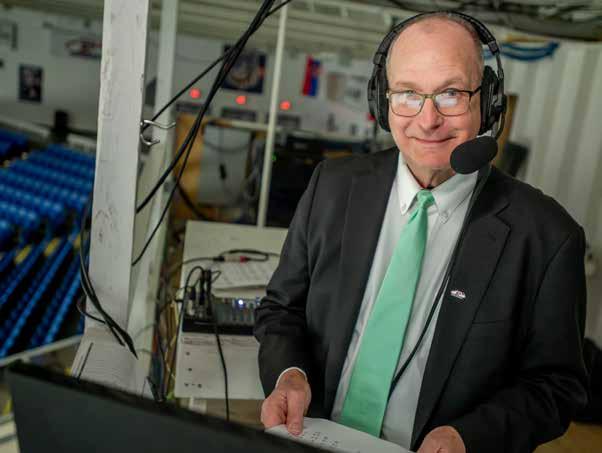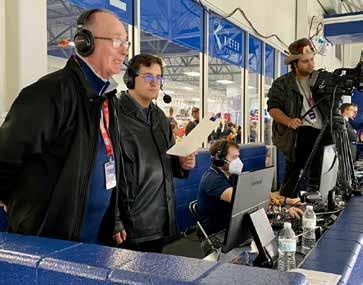
6 minute read
MAKING THE RIGHT CALL
Broadcaster Pete Krupsky makes health changes after heart attack scare
In January 2013, longtime sports broadcaster Pete Krupsky didn’t have much time to pay closer attention to the symptoms of potential heart trouble.
Advertisement
He felt tired most of the time, and missed plenty of sleep, too. But he experienced an intoxicating rush of adrenaline whenever he put on the headset to broadcast another Plymouth Whalers hockey game from his perch above the press box at Compuware Sports Arena.
“The fatigue was always there and I ignored it,” said the 70-year-old Krupsky, who more than a decade later still is a local broadcasting dynamo –although the Whalers are gone now and Compuware is home to USA Hockey’s National Team Development Program (NTDP). “The reason I ignored it was we had a really, really good team.”
Glancing down at a 2012-13 Whalers roster sheet, it featured future NHL players such as Vince Trocheck, Rickard Rakell, Tom Wilson and goalie Alex Nedeljkovic.
Krupsky – in the midst of what would become a streak of 1,443 continuous Plymouth Whalers games called between 1997-2015 – carried on the rest of that season like the hockey gamer he is. He didn’t miss a single contest during the Whalers’ stretch drive, which ended with a playoff loss to London.
But soon after the final buzzer, reality set in that he needed to make a far more important call – one about his own health.
“The next day (after the Whalers were eliminated), my son Gordon graduated from Oakland University,” he noted. “I want to say the day after that I was cutting my lawn and couldn’t finish it, I was out of breath. So my wife (Twyla) said ‘You better get checked out right now.’”
Soon thereafter, Krupsky found himself in the hospital diagnosed with atrial fibrillation, often called a-fib.
“They (doctors) said ‘You’re close to having a stroke,’”
By Tim Smith

Krupsky recalled. “It was the reason I was tired all the time and couldn’t walk from my car to the cubicle without being out of breath.”
Atrial fibrillation’s main symptom is the upper chambers of the heart pumping uncontrollably fast and out of sync with the lower chambers. As a result, proper blood flow throughout the body cannot be maintained.
“They shocked my heart and they hoped that would rectify it,” he continued. “I got back on my feet roughly two weeks later and I was put on blood thinners.”
Krupsky got through that crisis, but had another one waiting in spring 2021 when he suffered a heart attack. A clogged artery known as the “widow maker” was surgically repaired with the insertion of a stint.
Between the two episodes nearly eight years apart, Krupsky decided to make important lifestyle changes such as increasing his number of daily, four-mile walks at Lake Erie Metropark. Or delegating duties at the office (where for years he was all things to all people in the broadcasting and media relations world).
Helping Himself
One thing Krupsky always had going for him, according to his family doctor Nancy Sabal, was a positive attitude and desire to make necessary changes. He didn’t merely hope for medical intervention to keep him from future danger.
“He owns the part of the disease that he can control,” Sabal said. “Some patients are very external oriented. They want something to do something to them to make it better. A lot of heart diseases require something from the inside to change.
“Also, Pete loves what he does. He can’t stop talking about it. People who find something in life where they feel truly happy have a whole different set of biochemicals circulating than somebody who feels stressed out, trapped, miserable.”
Krupsky also loves getting out for his long walks in nature, which he likes to equate to his experience broadcasting games (he also has called many Schoolcraft College basketball and soccer contests over the years).
“What I’ve done since the heart attack is just turn it (societal noise) off,” Krupsky emphasized. “It’s four miles and some people say it’s boring. But it’s kind of like a broadcast. It starts at one spot – just like a game starts at 0-0. But the view changes every couple minutes -there’s always animals running around.”
He tracks his walks on a smartphone app called
Runkeeper and estimates he’s gone on approximately 600 sessions totaling 2,400 miles. Those numbers go up every single day, since Krupsky makes those long walks – without human company – part of his ongoing daily regimen.
“That’s one of the reasons I think I’ve done so well,” Krupsky said. “The walking definitely helps. … But walking is more than just physical, it’s also mental. You’re out, the phone’s turned off except for tracking your miles.”
Another reason for his solitary walks is peace of mind.
“I like the solitude,” Krupsky said. “Broadcasting’s the same. I work with nobody right now. The good thing about it is, if there’s a mistake I know who to blame.”
Having a trusting two-way relationship with medical professionals such as Sabal and Courtney Gearhart, the latter a physician assistant practicing cardiology, also is part of the best prescription to recover from cardiac episodes and enjoy healthier heart life.
Gearhart agrees about how invaluable it is for patients to continue favorite hobbies, activities, anything they enjoy doing.
“It is incredibly important for patients to continue to do what they love even after a health crisis,” Gearhart said, “because it helps them to understand that their medical issues don’t define their lives and can often be managed without sacrificing the things they love to do.”
Following both his a-fib event and the heart attack, Krupsky also did something crucial –he followed doctors’ orders, including taking all prescribed medications.
“Pete has atrial fibrillation and coronary artery disease (which) are often very treatable if you do your part,” Sabal said. “He’s been successful because he takes medications he’s been recommended to take. He doesn’t always like those medications, but he doesn’t trick himself into not taking them. And he never stops a medication without talking to his healthcare provider.” into the job at USA Hockey Arena provided comfort and encouragement. During his time away from the rink, players would upload videos with “Get Better Krup” messages.
Back In The Booth
When Krupsky did get back to business, his load was lightened with some duties shifted to other members of his approach hasn’t changed too much.
“I’ve been told, and this is gratifying, ‘Wow, it’s an education listening to you broadcasting games. You always come up with something I never thought about,’” he said.
And he still has a knack for injecting humor and witty remarks. During a recent NTDP game, a player tapped in a back-door pass. Krupsky’s description of that play was “He went right to the kitchen and helped himself into the refrigerator with the deflection.”
Krupsky’s timeless repertoire includes something he originally ad-libbed during a Plymouth Whalers broadcast: he personally thanks listeners, which in 2023 means wherever they are watching on their laptops or smartphones.
Many of those folks take the time to reciprocate, thanking Krupsky for doing all he does.
Krupsky is on Xarelto, a blood thinner, and will be for the rest of his life. Patients with atrial fibrillation are at higher risk for blood clots and subsequent strokes. Also on his daily totake list: Entresto, Metoprolol Succinate, aspirin and a “super vitamin” called AREDS 2.
According to Krupsky, another essential “script” is getting sound advice and guidance from Sabal and Gearhart. They don’t sugar-coat the truth, and he appreciates that.
Mental health also is key for patients to not have to return to cardiology departments anytime soon.
To that end, Krupsky’s knowing he could ease back
USA Hockey’s media staff.
“The way I put it is I might have lost a little bit off my fastball but I’m still getting guys out,” Krupsky said. “I’m still productive. They have shifted my role. I’m not doing media relations anymore. They let me concentrate on the broadcasts (all on-line, via www. usahockeyntdp.com/watch).”
Krupsky, who during his long Whalers career could be heard over radio stations such as WSDS 1480, WXBX 1310 and 88.1 The Park, still researches opposing players and teams before every broadcast.
Ever since USA Hockey’s partnership with the Schoolcraft Sports Network ended in 2019-20, that part of
They applaud him for being on-point while pronouncing complicated player names, and is knowledge of USA Hockey.
“I’ve developed this audience and it’s a different kind of audience. It’s hard-core,” Krupsky continued. “These are people that know these players. Most (Detroit) Red Wings’ fans don’t follow this. Most high school fans don’t follow this.”
Whereas the pre-2013 Krupsky might have fretted about getting bigger crowds at USA Hockey Arena, these days he shrugs and goes on to his next game. Staying healthy and happy are his top priorities now. Thankfully, Pete Krupsky aces both objectives with every hockey broadcast.
To hear Pete Krupsky call USA Hockey games, visit www. usahockeyntdp.com/watch.















